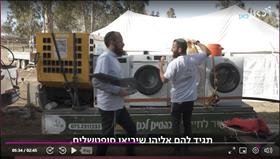As War Continues
As War Continues, Israel and Hiddush Look Ahead
During recent days, as national challenges in Gaza and the north continue, the report regarding the Meron disaster emphasizes how essential is an independent judiciary to ensure a healthy democracy
10/03/2024 17:09
Tags: Meron disaster · Gaza · Hiddush

Volunteers drive between army bases with washing machines on a truck, to wash soldier's laundry
Dear Friends,
It is the 157th day since the October 7th massacre. There is not a day that goes by that we don't have tears in our eyes as we watch new testimonies about what happened and relive the horror and terror that was the share of the victims, and the suffering of their family members and friends who are doing all they can to bring about the release of the hostages. In addition to these, we feel the deep pain upon reading the names of the fallen from the fighting units, as we listen to their life stories which were cut short. And yet, our hearts are also full of pride as we observe the determination and courage of the soldiers and officers, as well as the wonderful resourcefulness of our civil society, that came to the rescue to fill the gaps in the government's malfunctioning.
The reality on the ground, including the military and political challenges in the south and the north, is becoming increasingly entangled, and there is no end or quick solution in sight. Worse than that - it is not at all evident that Israeli leadership has a clear exit strategy that will return Israel and the region to a path of stability, security, and healing.
All these have far-reaching impact, both on the increasing internal tension and on Israel’s international relations. The number of our friends and supporters in the world is shrinking. Criticism of Israel's actions, along with indifference to the horrors of the massacre and growing antisemitism, make the reality that we live in further difficult and challenging, both in Israel and in the Diaspora.
Last week, after almost three years, the report by the State Commission of Inquiry into the Meron disaster was published. The committee investigated the death of 45 celebrants who were attending the annual mass religious celebration in memory of Rabbi Shimon bar Yochai on Mount Meron. The disaster was the most severe civil disaster in Israel's history. The report places the responsibility for the disaster on both the Prime Minister and other elected officials connected to the event, as well as the Israel Police and additional agencies who were responsible for it for decades yet failed to ensure the safety of the participants. Instead, they preferred to acquiesce to the political pressures of Haredi figures who assumed organization of the event. Not surprisingly, the public and the media connected this horrific civil disaster and the worst military disaster since the establishment of the state, which occurred on October 7th. The State Commission of Inquiry criticized a “bad culture” within public institutions, which made the disaster possible. The lines connecting the two events, as well
As we endure the difficulties and pain there is also a striving for healing and change
as the refusal of many elected officials to acknowledge their responsibility and guilt while engaging in rhetorical, factual, and legal acrobatics to distance themselves from responsibility – are clear to all.
Nonetheless, as we endure the difficulties and pain there is also a striving for healing and change. We will surmount the security challenges, even if the necessary moves are slow and bear the painful price of blood and destruction to civilian populations on both sides of the border (in the south and north). We overcame no less difficult situations in the past. But it seems that current events are generating new insights within Israeli civil society, as well ,and charting a different path than the one Israel walked in previous decades. An integral part of the transformation is the understanding of how important it is that we have an independent judiciary with authority. We have learned during recent days how essential its existence is to ensure a healthy democracy.
At the same time, our readers should not assume that when the canons roar, the struggle for religious freedom and equality are swept aside to the margins of awareness and public discourse. On the contrary. There are many important issues in these areas that occupy the political arena as well as the media even as Israel is confronting military challenges , exacerbate these conflicts even further. Among these are the struggle over the State budget and the billions of shekels that the government coalition is attempting to transfer to the especial interests of its partnering parties (especially the ultra-Orthodox) instead of dedicating all available funds for the urgent needs that the war created. There is also the fight over the conscription bill as Israel once again confronts the question of equality in shouldering the burden of security. We have written quite a bit about the conscription bill in the past. Now the issue has reached the boiling point, due to the ultimatum set by the Supreme Court for the expiration of the mass exemption long enjoyed by the ultra-orthodox public under governments of the right, the left and the center.
Hiddush is actively involved in these two issues and in the other religious and state conflicts that are on the agenda even during war. We will report in greater detail in the next newsletter.
We continue to express our confidence and belief that “We shall overcome,” and we add our voice to the demand for the return of the hostages as the first and foremost goal: Bring them home now!
Best wishes,
Stanley P. Gold & Rabbi Uri Regev
Hiddush – Freedom of Religion for Israel
Watch on Kan Doco